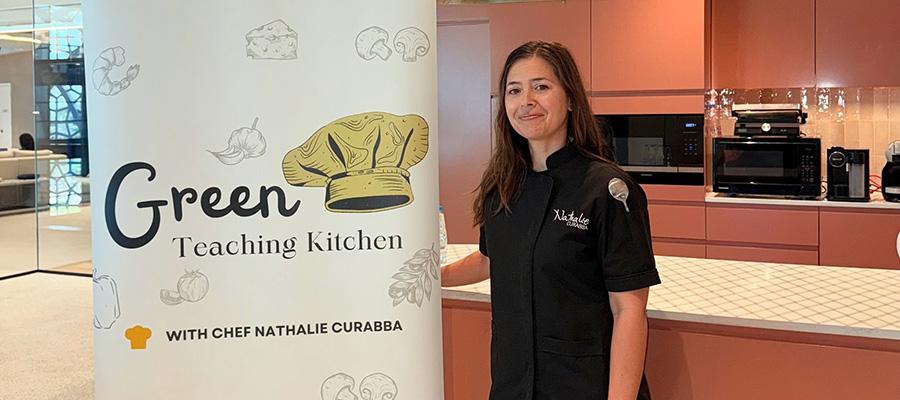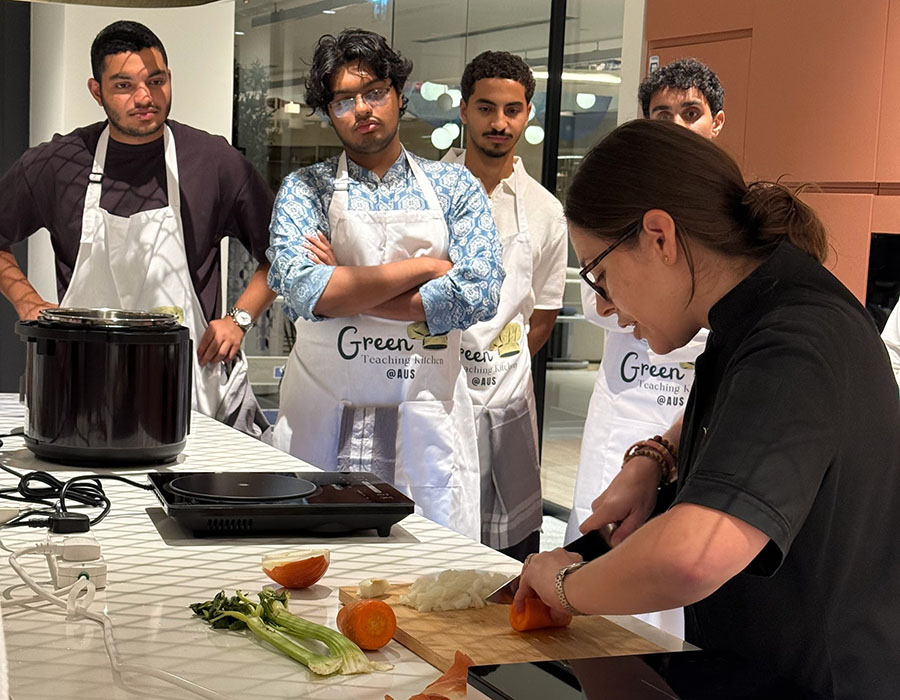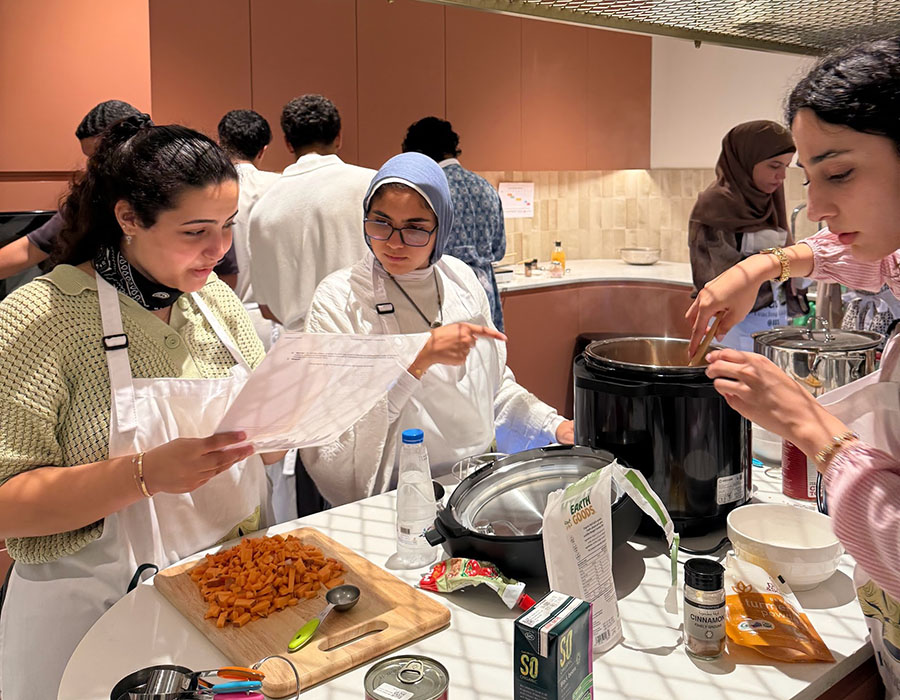- About
- Admissions
- Study at AUS
- Prospective Students
- Bachelor's Degrees
- Master's Degrees
- Doctoral Degrees
- Admission Publications
- International Students
- Contact Admissions
- Grants and Scholarships
- Sponsorship Liaison Services
- Testing Center
- New Undergraduate Student Guide
- Undergraduate Orientation
- New Graduate Student Guide
- Graduate Orientation
- File Completion
- Payment Guide
- Students with Disabilities
- Executive and Continuing Education
- Academics
- Life at AUS
- Research
- Publications
- Contact Us
- Apply Now
- .

Cooking up change: AUS launches Green Teaching Kitchen in partnership with Sheraa
American University of Sharjah (AUS) has launched the Green Teaching Kitchen @ AUS, the first university-based teaching kitchen in the Middle East to link food, health and sustainability through hands-on cooking classes. Hosted in partnership with the Sharjah Entrepreneurship Center (Sheraa), the initiative uses a living-lab model—a real-world learning environment where the kitchen itself becomes a classroom.
Led by AUS Sustainability Manager Nathalie Curabba, who designed and developed the program, the Green Teaching Kitchen combines practical cooking skills with systems thinking, linking everyday choices to broader questions of nutrition, personal wellbeing and planetary health. Nearly 200 students applied for only 20 places in the first cohort, demonstrating strong demand for its practical and sustainability-focused life skills. The aim is to give students both confidence in the kitchen and a deeper awareness of how their individual and collective actions can contribute to tackling global sustainability challenges.
Building a more sustainable campus, one cooking class at a time
"The kitchen is a powerful classroom where learning is hands-on and practical. Students discover a connection to food and learn how to make healthy, affordable meals despite busy schedules. They develop the insight that their food choices have wide-reaching effects in their own lives and the wider world," said Curabba.

“The Green Teaching Kitchen began as Cook for Change, a small student activity during the university’s Week of Welcome,” continued Curabba. “That was followed by the Cooking for Climate classes, which helped students connect everyday food choices to climate change in the lead-up to COP28. These classes, part of the Eating with Intent campaign, introduced students to sustainable cooking practices such as using local and whole foods, reducing food waste and cooking with minimal equipment.”
Curabba reflected: “The Green Teaching Kitchen takes these efforts further by moving from short-term activities to a structured, six-module program with long-term impact. We’re incredibly grateful to Sheraa for providing us with a space to build on the successes of past programmes and turn these initiatives into something that will hopefully be bigger and even more impactful.”
“At Sheraa, we are committed to fostering initiatives that enhance Sharjah's entrepreneurial ecosystem and empower the next generation of changemakers. The Green Teaching Kitchen exemplifies how innovation in the food and beverage sector begins in the kitchen, where creativity is transformed into practical skills with lasting impact. Our collaboration with AUS, a key partner in our mission, enriches the student experience by equipping them with the mindset, tools, and opportunities to grow as leaders and drive a more sustainable future,” said Abeer AlAmeeri, Director of Ecosystem Development at Sheraa.
In addition to empowering students to “cook for change”, the program will be studied through a Faculty Research Grant obtained by Brad Curabba, Senior Instructor in the AUS Department of English, as part of which its outcomes will be carefully tracked and monitored to capture how hands-on learning in the kitchen influences behavior, builds environmental awareness and supports healthier, more sustainable lifestyle choices.

“I’ve always loved cooking, but Nathalie’s classes taught me just how powerful it is to be intentional about the ingredients and food I choose. Creating tasty, nourishing meals with locally sourced ingredients has made me feel more independent and present, turning cooking into an act of self-care. It’s made me mindful of how every choice I make supports both my well-being and the planet,” says Maryam Khan, a student who took part in the Cook for Change initiative.
Future plans: Growing the impact of the Green Teaching Kitchen
Looking to the future, the sustainability team plans to expand the program and explore several new avenues for partnerships, including new workshop formats and additional offerings, such as establishing a dedicated space for the Green Teaching Kitchen and providing workshops to AUS faculty, staff, and the broader community. They also plan to explore initiatives in culinary medicine and nutrition security, and expand collaborations with entrepreneurs and innovators through Sheraa.
For now, the Green Teaching Kitchen @AUS is already achieving significant positive change by placing food at the center of sustainability education and providing students with the skills, confidence and mindset to understand how everyday choices, such as what they eat, shape their future and that of our planet.
For more information about AUS’ sustainability initiatives, visit: www.aus.edu/life-at-aus/sustainability

